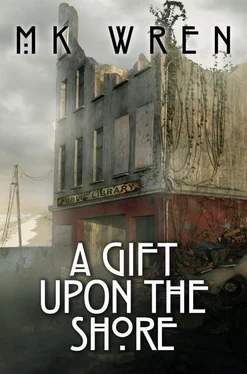Rachel ordered the dogs to stay, then: “Mary, wait here. I’ll go in.”
Mary shook her head. “No. We’ll go in together.”
Inside the door was a small foyer. On the wall opposite the door, Connie had proudly hung a painting, one of Rachel’s encaustics. Now it lay on the floor, its frame splintered, bone white gesso ground exposed in a hectic pattern of crisscross streaks.
On the wall where the painting had hung was a huge hieroglyphic of a skull executed in spray paint in black and blood red.
Mary pressed a hand to her mouth, gasping for breath, eyes closed to shut out that monstrous image, but the skull icon was limned in memory with a night of terrified flight.
Rachel turned away, crossed to the double doors on the left that opened into the living room, and Mary swallowed at the constriction in her throat, fighting the resistance of her muscles. But again, she followed Rachel.
Some maniacal beast had been unleashed in this room: furniture was overturned, smashed, slashed; bookshelves toppled; the white walls hideously muraled with obscene, spray-painted graffiti and stitchings of bullet holes; the cabinets where Connie kept her china and crystal empty, doors ripped off; the floor graveled with shattered glass and porcelain.
Rachel’s whispered “ No …” echoed in the silence, and the sheer agony in her eyes made Mary want to cry out. Then it was gone, and nothing took its place. Nothing.
And where was Connie? Where was Jim?
There on the far wall—that wasn’t just more demented graffiti. Spattered red brown and a curving, downward smear. Mary couldn’t see the bottom of the smear; the overturned couch blocked her view. She made her way toward the wall, glass grinding under her soles.
Jim lay with his back against the wall, and he looked like something old and tattered that had been tossed away, his clothing and flesh riddled with bullet holes, caked with dried blood. Even his face had been smashed by craters of bullets.
For a long time Rachel stood motionless, staring at Jim’s body, then without a word, she turned away, walked slowly toward the kitchen.
Rachel, don’t go in there. Don’t go …
Mary followed her. And they found Connie.
On her back on the floor, naked from the waist down, legs splayed, cold, dusky skin smeared with blood. Around her neck, the telephone cord cut deep into swollen flesh. Her face was bloated and purpled, tongue protruding, open eyes filmed like acid-dipped glass.
Mary felt darkness suffocating her, and perhaps she screamed, but she didn’t hear it; she didn’t hear or see anything until finally she recognized Rachel’s face only inches away, felt the hard grip of her hands on her arms. But Rachel’s eyes were as devoid of life as Connie’s.
She said, “Mary, we have to go back to Amarna to get the van.”
And Mary accepted that not because she understood it—she understood nothing at this moment—but because it imposed some semblance of structure on the chaos in her mind.
She didn’t remember the walk to Amarna. She was only vaguely aware that Rachel left the dogs there, vaguely aware after a passage of ambiguous time of Rachel backing the VW into the driveway at the Acres house.
Rachel took the machete from the van, and Mary followed her to the back of the house and watched with neither comprehension nor curiosity while she hacked at the blackberry vines shrouding a mound of earth. Beneath the camouflage of vines, a metal door lay at an angle in the earth, brown paint rotten with rust. Rachel had a key for the lock. Together they pulled the heavy door back, hinges wailing. Under it, nine cement steps, another door. Rachel found the kerosene lamp and matches in the niche at the foot of the stairs. The yellow light went before them into a cell of a room. Jim’s radiation shelter. Shelves filled with boxes, jars, canisters lined the walls. The air was chill and sterile.
Rachel went directly to a cabinet by the door, and it was then that Mary realized that all this had been rehearsed in a sense. Rachel had been told what she must do in case…
Mary couldn’t hold on to that train of thought. Rachel opened the cabinet. A gun rack. Two rifles, a shotgun, three handguns. Two slots were empty. She thrust a rifle into Mary’s hands. It was heavier than she expected, black metal, polished wood, the lens of the telescopic sight all gleaming with exquisite menace. In front of the trigger guard was mounted a flat, curved magazine, its steel dull and gray.
Rachel’s voice was as dull and gray as the steel. “It’s semiautomatic. That’s the safety there. You have thirty cartridges in the clip.”
Mary nodded, accepting those terse instructions as if this weren’t the first time she’d handled such a weapon. Yet its lethal potential didn’t take shape in her mind. She saw Rachel pull another rifle out of the cabinet, put the sling over her head, and shift the gun so that it angled across her back. Mary followed her example.
Then together they set to work.
Rachel and Mary became looters—purposeful, conscienceless, and guiltless—programmed by imperatives Mary still didn’t understand.
We’ll need these things .
Perhaps Rachel actually put it into words. Mary was sure she didn’t add: to survive .
Through the summer afternoon under a blue sky dappled with opaline mackerel clouds, they looted the shelter and house, loaded the van time and again, drove to Amarna, emptied their plunder into the garage, then returned for more. They didn’t touch the bodies except to cover them with sheets. And Rachel didn’t shed a tear, didn’t speak an unnecessary word. She moved, as she always did, at a deliberate pace, but she didn’t once stop moving. Her eyes remained lifeless, and sometimes Mary was convinced she’d been struck blind by shock. Yet it was obvious that her eyes did at least register the images necessary to her. Her whole body seemed to function on that basic level. No doubt her heart still beat. She still breathed. Mary could see that: shallow breaths through parted lips.
Food, clothing, linens, tools, paper, books—all the books—anything the Rovers hadn’t destroyed went into the van, then into the garage at Amarna. Mary didn’t look at any of it, refused to recognize it as touching the lives of two people she had called friends. Only one thing briefly commanded her attention: the engraved handcuffs Jim was awarded when he retired as chief of the Shiloh Veepies.
And finally, when the last load had been piled into the van, Rachel climbed into the driver’s seat and asked, “What happened to Sparky?” But she didn’t seem to expect or want an answer to that question. Eyes fixed ahead, she drove away from the Acres house for the last time.
When they reached the gate at Amarna, Mary got out to open it, then after Rachel drove through, she pushed it shut. Her hands shook as she fumbled with the chain and lock. Pulling up the drawbridge, letting down the portcullis. She should call Harry Berden. Not that Harry could do anything. The cavalry was under siege, too, and the captain had lost a third of his troops two nights ago in the battle of the mall. But he could send someone to decently dispose of the bodies.
She turned away from the gate, looked up, seeking the sun, then looked down to the glow behind the wall of clouds in the west. Her watch blinked the time: 8:14. She got into the van, tried—and failed—to think of something to say to break Rachel’s terrible silence.
Rachel stopped the van in front of the garage, but all she said was, “We’d better move some of the stuff so we can get the van inside.”
Shadow and Topaz came to greet them, but they were subdued, panting despite the evening chill. Rachel and Mary worked in the waning light, shifting cartons and sacks into the north studio or the basement, until finally there was enough room in the garage for the van. The van was still full, but they didn’t try to unload it. All they took with them when they left the garage was their rifles. The door rumbled shut, and Mary leaned against it, her knees on the verge of giving way.
Читать дальше












